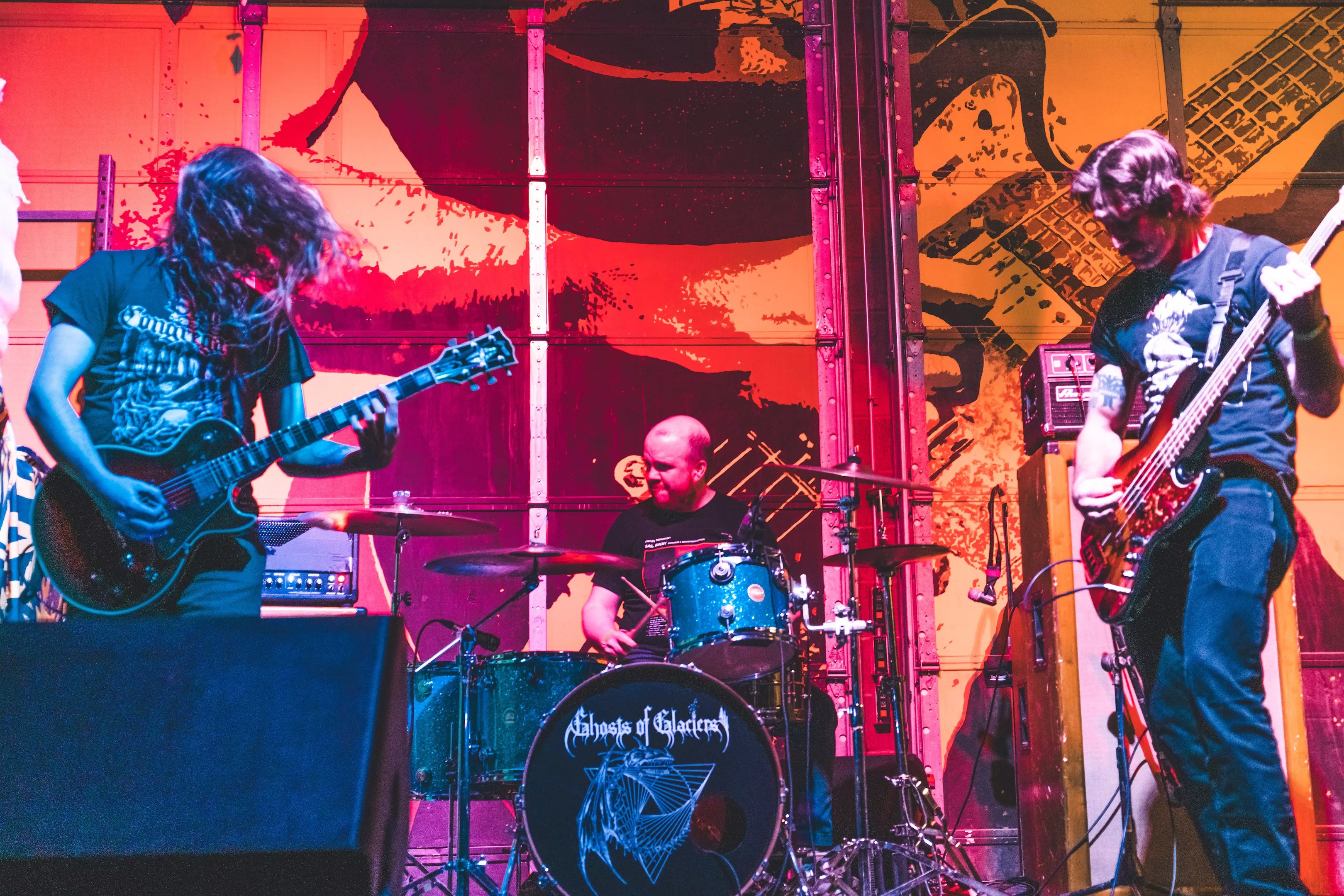
Courtesy Ghosts of Glaciers

Audio By Carbonatix
Steven Jackson sits in his home office surrounded by the tools of his trade.
He’s organized the space in an orderly manner that best suits his artistic endeavors. Behind his desk, there is a rack of guitars, including his go-to black Gibson Les Paul, pushed tightly against a collection of amps and cabs varying in size and audial intensity. He knows exactly which one does what and how to combine instruments with output for desired effects.
The walls around him are adorned with inspiration in the form of band banners – a morbid mix of tapestry if you’re unfamiliar with the metal music it proudly displays. Despite the harsh subject matter, it exudes a certain level of serenity, a knowledge of the obscure that only those in the know can communicate. Over his shoulder, the brooding purple hues of a familiar black-metal masterpiece – the cover of Emperor‘s 1994 debut, In the Nightside Eclipse – provide a gothic backdrop.
Jackson, a longtime local musician and audio engineer, is excited to see the Norwegian group’s first-ever Denver concert on May 13, when Emperor will perform In the Nightside Eclipse live.
“I’ve been into them since high school,” he says. “I’m trying to figure out my ticket situation.”
He spins to his left to reveal a flag for Entombed‘s Left Hand Path. Many a metalhead, the 33-year-old Jackson included, consider the 1990 album required listening for its “chainsaw” guitar attack.
“I’m a huge fan of Swedish death metal,” Jackson says, showing off the cold-blue visage. “The tone, HM-2, chainsaw guitar tone.” (For the uninitiated, HM-2 is a distortion pedal.) “I use it as a boost pedal, basically, for certain parts, to push it over the top,” he explains. “My main distorted tone is really just my tube amps distortion with similar things that I stack on it, but I will use the HM-2 – especially for doomy parts and a couple other things – to really push it over the top.”
Given his alternative education in the metal underground, Jackson is well-versed in the intricacies of such gear and getting a guitar to do whatever he wants. That much is evident as he dives deeper into the minutiae and creative-process specifics behind his latest work, Eternal, from his longstanding Denver band, Ghosts of Glaciers.
The instrumental album, released on October 25 via Pennsylvania label Translation Loss Records, is a clinic in progressive post-metal. Jackson, bassist Michael Rouse and drummer Ben Brandhorst constructed a cohesive instrumental magnum opus that, when listened to in its entirety, surprises in its multitudes.
“It’s almost cliché to say, but I think it’s our best material yet,” says Jackson, who is also a guitarist in Denver splatter-trash outfit Axeslasher and has worked for the Fire in the Mountains festival since its inception in 2018. “It’s just homing in on what we’re doing and [making it] even more heavy and ethereal and atmospheric.”

Don’t sleep on Ghosts of Glaciers, seen here playing last year’s Decibel Magazine Metal & Beer Pre-Fest at Ratio Beerworks.
Courtesy Ghosts of Glaciers
Eternal kicks off with two twelve-minute tomes in “The Vast Expanse” and “Sunken Chamber,” the classically inclined tranquility of the opener eventually giving way to the blackened brutality of the latter. Fittingly, the third track, “A Breath,” is just that, a brief reprieve from the bludgeoning opening sequence and midway point. Dialing back the length in favor of brevity, the second half kicks off with the progressive-metal banger “Leviathan,” in which Ghosts of Glaciers further reveals its breadth. Similarly, “Ruined Fortress” sees the band morph into monolithic doom, built brick by brick with Jackson’s thick guitar, Rouse’s low-end bass work and Brandhorst’s merciless drumming.
The crescendo subsides for the album’s solemn closer, “Regeneratio Aeterna” (a Latin phrase that roughly translates to “eternal rebirth”), on which Jackson jumps on the grand piano and plays a melody he first introduced with his guitar on “The Vast Expanse.” It’s a beautiful piece, something not often experienced in this type of metal, and a perfect full-circle moment for such a self-contained work of art.
“That melody is in the very first song. It’s a finger-picking thing in a cleaner section. I basically rearranged it when we were writing ‘The Vast Expanse’ and felt like it would be a cool way to end the album,” Jackson says. “Also, because it circles around to that song again with the whole concept of the ouroboros – a snake eating its own tail – that we have in our music in general, that endless cycle of death and rebirth in the universe.”
Be reborn with Ghosts of Glaciers during the Eternal release show at the hi-dive on Friday, January 24. Denver doomgazers Palehorse/Palerider and Colorado Springs death-sludge quartet Clarion Void are also on the bill.
Audiophile Jackson is more than happy to dissect the sounds and external influences that went into Eternal, from the technical points – such as employing Drop A tuning, a whole step lower than the past Drop C preference – to how a visit to Washington’s Olympic National Park during the group’s inaugural tour ultimately inspired the album’s artwork.
“We went up to the rainforest up there, and it just completely blew our minds,” he recalls. “It was a formative time and a very awesome experience for us – that forest being so green and lush and overgrown so much, just the density of everything.”
Thanks to artist Adam Stone, the Eternal cover depicts “an overgrown forest, in a way,” Jackson says. “It’s how fungal networks in forests are constantly decomposing everything and growing and dying and constantly doing that into itself. The microcosm, like when you zoom in really far on the forest floor.”
The Gothic script of the band logo, album title, song titles and sigil were hand-drawn by Jackson, using pen and ink on paper, which were then scanned and digitized for the album art. “I’ve been doing Gothic calligraphy for a number of years, and I’m really happy to be able to showcase it a bit on this album,” he says.
He goes on to bare the band’s bones, explaining how the members construct a Ghosts of Glaciers song out of the ether. “We just start with a number of riffs, as like a skeleton, things that can fit together, and we just play them a bunch, over and over. Sometimes I have a very specific beat or feeling in mind, and I’ll hold to that. But Ben will just do things on the drums that will then lead my hand to other things,” he explains.
“We’ll play this stuff, then it gets more fleshed out as it goes from a skeleton, then a bit more muscles over it and the flesh,” Jackson continues, sounding more like Dr. Victor Frankenstein than a metal musician – though he prefers a Spectral Voice long-sleeve to a lab coat. “Then it’s putting the finishing touches on it and getting those dynamics of the transitions to feel right and not forced and weird.”
But nothing feels forced or weird about Ghosts of Glaciers. The patience and attention to detail that went into Eternal, in particular, is admirable and, for a listener, much appreciated. The drums and piano were laid down and recorded in the hallowed halls of Calvary Baptist Church of Denver in January 2022 with Ben Romsdahl of Juggernaut Audio. The space allowed for a “full, natural room tone.”
“The whole record is supposed to feel pretty organic – real speaker cabs and tube amps, real reverb of the room on the drums,” Jackson says. “Ben, with his drumming, he brings really interesting rhythmic ideas to the table.”
After forming in 2010, Ghosts of Glaciers (or Glaciers, as Jackson calls it) naturally evolved into the incarnation that can be heard on Eternal. While there have always been elements of black and death metal, prog and doom, even strands of jazz, in the trio’s music, at its core it’s the maturation and consistency of the three members all being there from the beginning that makes it work so well.
“It’s like an ever-changing, developing thing that we try to explore all different types of moods with our music,” he says. “When we’re all feeling it and playing really well at a show, you can lose sense of time and space, and it’s a profound thing.”
Fourteen years in, the band’s main message remains unwavering: “The duality of life; the push and pull; the natural, I guess you can say, tension and release that is important for good music. We really try to make those atmospheres,” Jackson says.
“It’s a very big part of our life – the creative energy that goes into it and all the dedication and time we put into it,” he concludes. “It’s really important life’s work, for sure.”
Ghosts of Glaciers, with Palehorse/Palerider and Clarion Void, Friday, January 24, hi-dive, 7 South Broadway. Tickets are $15.